2024年人教版七年级下册期末复习 U11-U12 课件 (共36张PPT)
文档属性
| 名称 | 2024年人教版七年级下册期末复习 U11-U12 课件 (共36张PPT) |  | |
| 格式 | pptx | ||
| 文件大小 | 47.6MB | ||
| 资源类型 | 教案 | ||
| 版本资源 | 人教新目标(Go for it)版 | ||
| 科目 | 英语 | ||
| 更新时间 | 2024-06-08 22:44:01 | ||
图片预览

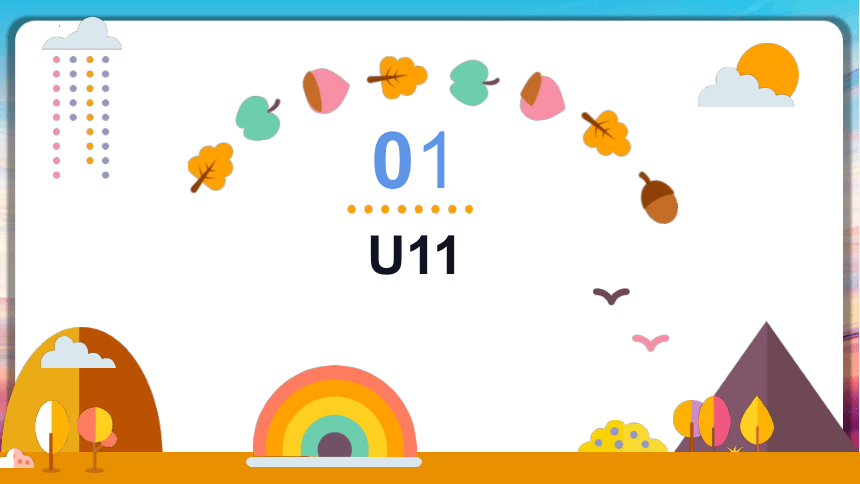
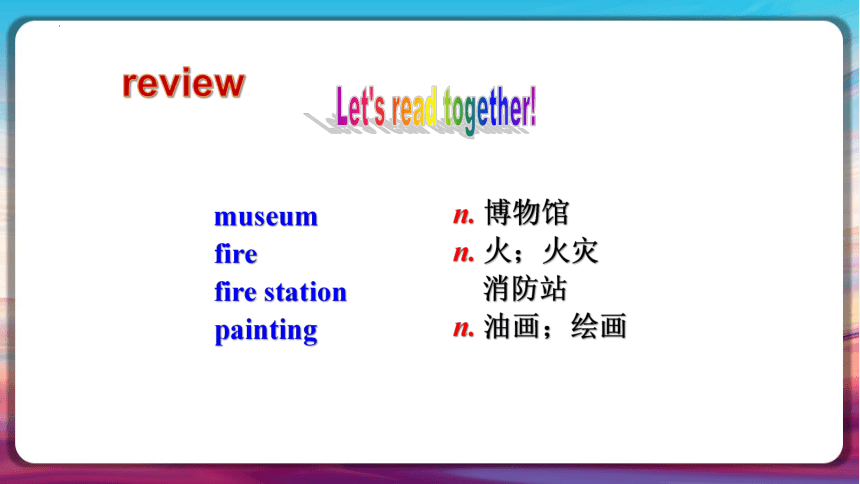
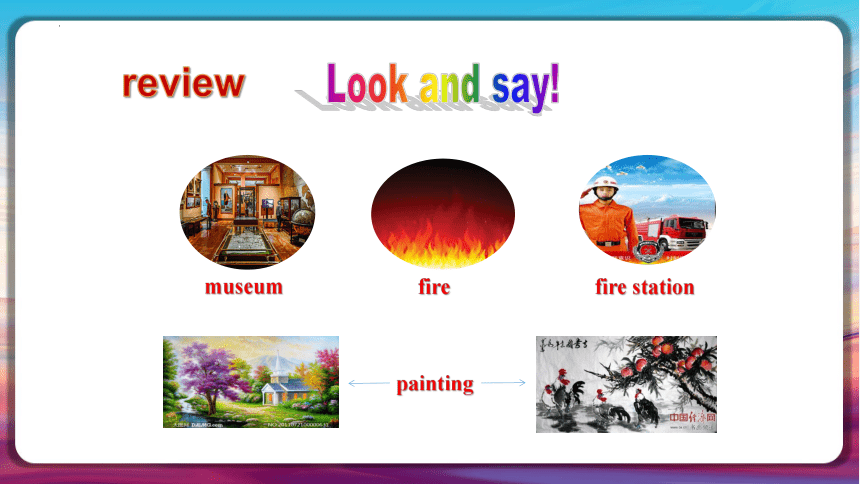
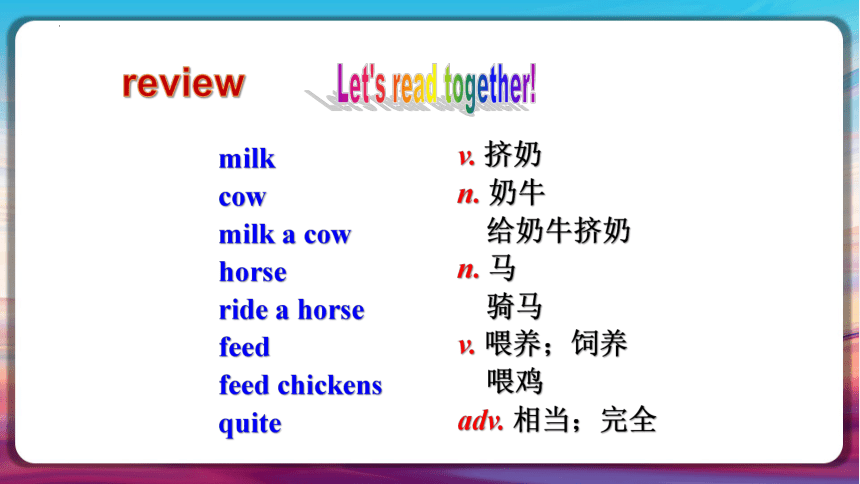

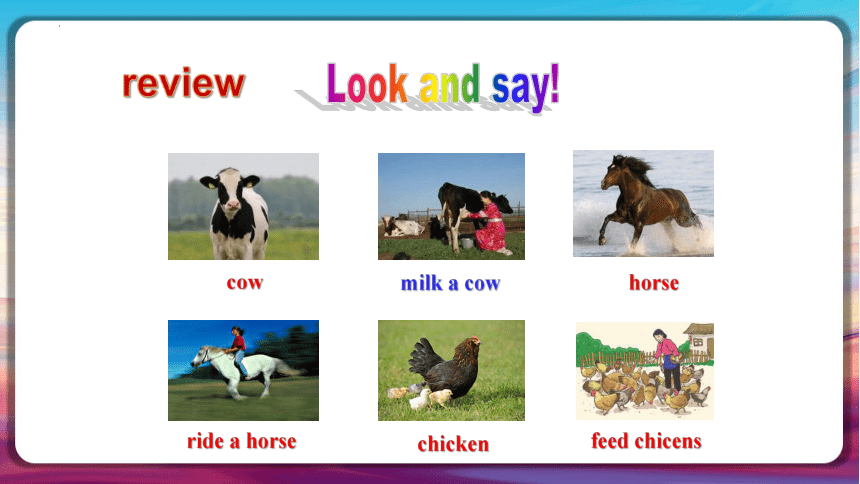
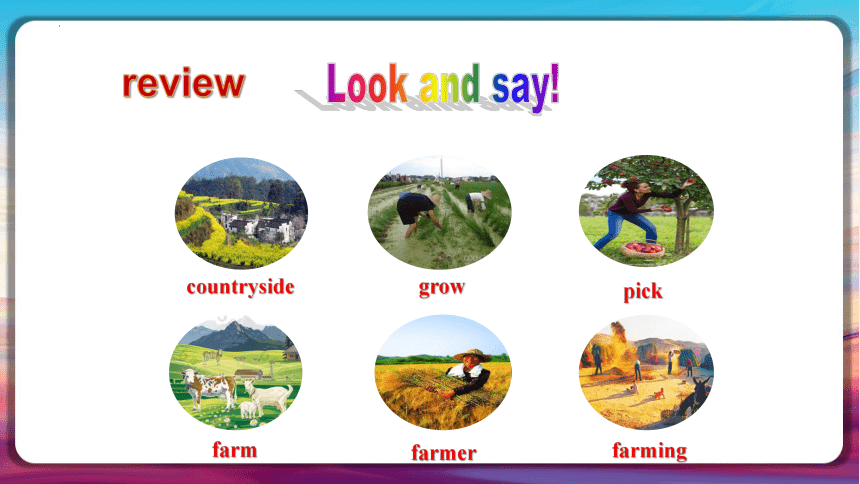

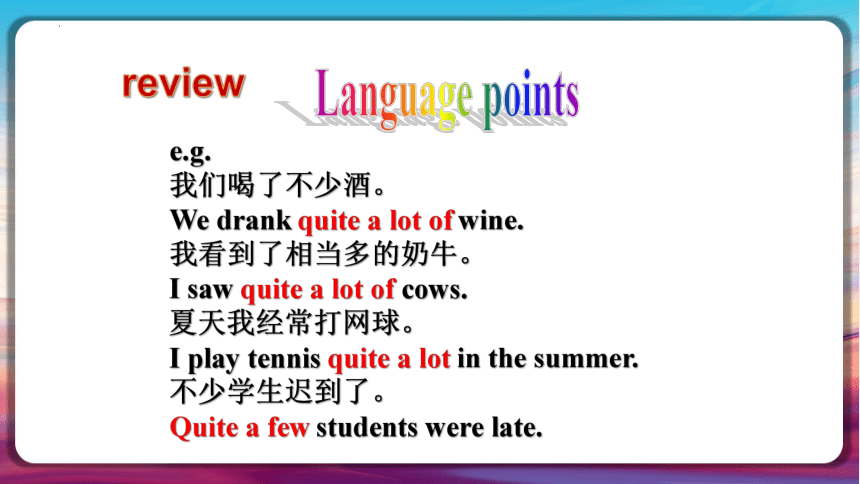


文档简介
(共36张PPT)
2024人教版
期末复习
U11-U12
U11
01
museum
fire
fire station
painting
review
Let's read together!
n. 博物馆
n. 火;火灾
消防站
n. 油画;绘画
fire
museum
fire station
painting
Look and say!
review
milk
cow
milk a cow
horse
ride a horse
feed
feed chickens
quite
v. 挤奶
n. 奶牛
给奶牛挤奶
n. 马
骑马
v. 喂养;饲养
喂鸡
adv. 相当;完全
Let's read together!
review
anything
grow
farm
pick
excellent
countryside
in the countryside
Let's read together!
pron. 任何事
n. 种植;生长
n. 农场
v. 采;摘
adj. 极好的;优秀的
n. 乡村;农村
在乡下;在农村
review
milk a cow
cow
ride a horse
horse
chicken
Look and say!
feed chicens
review
grow
countryside
farm
pick
farmer
Look and say!
farming
review
1) quiet a lot “相当多”,可以单独使用;也可
以在后面+ of +可数或不可数 。
quite a little “相当多” +不可数名词
quite a few “相当多” +可数名词
1. Did you see any cows
Yes, I did. I saw quite a lot.
Language points
review
e.g.
我们喝了不少酒。
We drank quite a lot of wine.
我看到了相当多的奶牛。
I saw quite a lot of cows.
夏天我经常打网球。
I play tennis quite a lot in the summer.
不少学生迟到了。
Quite a few students were late.
Language points
review
2) quite adv. “相当;完全;十分;很”,它不但能修
饰动词、形容词、副词,还能修饰名词。
① quite修饰形容词、副词等。例如:
She is quite right.她完全正确。
She sings quite well. 她唱得非常好。
② quite修饰名词。
1. 当名词前没有形容词修饰时,quite要放在冠词前。quite a lot(许多),quite a few(相当多),quite a little(相当多;大量的)
2. 当名词前有形容词修饰时,quite可放在冠词前,也可放在冠词之后,但放在冠词之前较普遍。
He is quite a clever boy= He is a quite clever boy.
Language points
review
take与photo, picture等词搭配时,表示“拍摄,摄影”。表示“拍摄某物或人”,就要在短语后面接介词“of”引入所拍摄的对象。e.g.
The girl likes to take photos of herself with her cell phone.
2. Did Carol take any photos
卡罗尔拍照片了吗?
Language points
review
3. fed chickens 喂鸡
feed vt. “ 喂养”, 后面可以直接跟宾语。Eg:
We fed the birds yesterday. 我们昨天喂鸟了。
常用结构:
(1) feed sth. to sb. 意为“把…喂给…吃”。
Please feed some grass to the cow. 请给牛喂点草。
(2) feed sb. on/with sth. 意为“用……喂……”。
Please feed the cow on/with some grass.
I feed my cat with / on fish. = I feed fish to my cat.
我用鱼喂猫。
Language points
review
4. I visited my grandparents in the countryside.
我去看望了乡下的爷爷奶奶。
a) visit 表示“拜访,看望,参观”,后面可以是宾语
可以是人,也可以是地点名词。e.g.
visit my teacher = call on my teacher
visit your school = call at your school
b) in the countryside 在乡下
countryside在此处等同于couontry,都是“乡下,农
村”之意,往往和冠词 “the” 搭配连用。e.g.
We spent a pleasant day in the country.
Language points
review
5. It was so much fun. 那真是蛮好玩的。
fun 表示“有趣的事情”,为不可数名词。
Look, Peter. The children are having so much fun.
彼得,你瞧,孩子们玩得多么开心。
He plays the violin for fun.
他拉小提琴只是为了好玩。
Swimming in the sea is great fun.
在海里游泳很好玩。
Language points
review
6. Sounds good. 听起来不错!
此句子省略了主语 it, 完整应该是 it sounds good.
此处sound为系动词,表示“听起来…”其后加形容词。
同样用法的单词还有feel, taste,smell, look 等等,表
示“摸,尝,闻,看……起来”。
This coat feels soft. 这件上衣摸起来很软。
The supper smells delicious. 晚饭闻起来很香
Language points
review
1. They had lunch at home this morning. (提问)
_____ ____ they ___ at home this morning
2. My school trip was great. (提问)
_____ was _____ school trip
3. Jack watched a basketball game last night. (提问)
_____ ____ Jack ____ last night
4. He saw something in the tree. (改为否定句)
He in the tree.
5. They had a good time at the party. (改为同义句)
They _______ ___________ at the party.
What did do
How your
What did do
didn’t see anything
enjoyed themselves
Exercise
根据要求完成句子
根据要求完成句子
1. They had lunch at home this morning. (对划线部分提问)
they at home this morning
2. We went there by bus today. (同义句转换)
We to go there today.
3. My school trip was very great. (对划线部分提问)
your school trip
4. chickens, in, we, some, countryside, fed, the (连词成句)
.
5. He saw something in the tree. (改为否定句)
He in the tree.
What did do
took the bus
How was
We fed some chickens in the countryside.
didn’t see anything
Exercise
一个美术博物馆
参观消防站
去钓鱼
去农村
看油画
你上一次的学校旅行怎么样?
an art museum
visit a fire station
go fishing
go to the countryside
see some paintings
How was your last school trip
= _____ was your last school trip ____
What
like
课时重点回顾
Summary
U12
02
camp
lake
beach
badminton
v. 扎营;搭帐篷
n. 湖;湖泊
n. 海滩;沙滩
n. 羽毛球运动
Let's read together!
review
away
run away
mouse
baby
shout
shout at
woof
language
adv. 离开;远离
跑开
n. 老鼠;耗子
n. 婴儿
v. 呼叫;喊叫
冲...大声叫嚷
interj. (狗叫声)汪汪
n. 语言
Let's read together!
review
sheep
as
natural
butterfly
visitor
tired
stay
stay up late
n. 羊;绵羊
prep. 作为;当作
adj. 自然的
n. 蝴蝶
n. 游客
adj. 疲倦的;疲劳的
v. 停留;待
深夜不睡;熬夜
Let's read together!
review
lake
camp
go camping
by the lake
camp by the lake
go camping by the lake
v. 扎营;搭帐篷
n. 湖;湖泊
看图片,说单词!
review
beach
go to the beach
on the beach
看图片,说单词!
review
draw-drew
speak-spoke
read-read
run-ran
sing-sang
swim-swam
write-wrote
ride-rode
Look and learn!
review
mouse 意为“老鼠”,复数形式为“mice”。
一只小老鼠从我的椅子底下跑过。
A little mouse ran under my chair.
他们看到了两只老鼠。
They saw two mice.
Language points
review
2. away adv. 离开;远离
① He lives 3 miles away from here.
他住在距离这里三英里的地方.
② Could you look after my dog while I'm away
我不在的时候你能帮忙照看我的狗吗?
run away 逃跑, 跑开
① The monkey has run away from the zoo.
那只猴子已经从动物园里逃跑了。
② He saw a wolf run away through the trees.
他看见一匹狼从树林里逃跑了。
Language points
review
3. that’s why it’s important to learn a second language.
那就是学另一门语言很重要的原因
⑴ that’s why后面跟的是结果,译为“那就是(为什
么)…的原因”,其中的why引导一个表语从句, 放在
be动词的后面。也常写成 that’s the reason why... .
Tom overslept, That is why he was late for work.
汤姆睡过头了。那是他上班迟到的原因。
that is because后面跟的是原因, 译为“那是因为...”。
Tom was late for work,That is because he overslept.
汤姆今天早晨上班迟到了。那是因为他睡过头了。
Language points
review
4. sheep 名词,意为“绵羊”。它是单复数同形的单词,当它作主语时谓语动词的单复数形式要根据它在句中的意思来确定。类似的单词还有deer (鹿), Chinese (中国人)等。例如:
Where are your sheep, Ted
Every sheep has a thick woolly coat.
每只羊身上都穿着一件厚的羊毛外套。
Language points
review
5. I worked as a guide at the Natural History Museum.
我在自然历史博物馆里做导游的工作。
work as ... 意为“担任 , 从事”。 例如:
埃里克在那家俱乐部里做音乐老师的工作。
Eric works as a music teacher in the club.
work at 从事于…,致力于…,钻研…
work on 对 ... 起作用,企图影响或说服,忙于...
work for 为...工作,为...做事,为...尽力,被...雇用者
work with 与…共事,与…协作
Language points
review
6. How interesting ! 多么有趣啊!
这是一个感叹句。
感叹句的三种结构:
① How + 形容词/副词 +(主+谓)!如:
How beautiful she is! 她多漂亮呀!
② What a/an +形容词 +名词单数 +(主+谓)!如:
What a beautiful girl she is !
她是一个多么漂亮的姑娘呀!
③ What+形容词+名词复数/不可数名词+(主+谓)!
What smart boys they are!
多聪明的小家伙!
Language points
review
7. stay up 意为“熬夜;深夜不眠” 。
不要熬夜,这对你的健康不好。
Don’t stay up late. It’s bad for your health.
咱们别睡觉,迎接新年的到来吧。
Let’s stay up to see the New Year.
区别:
1、stay up doing = stay up and do...(doing 状语,表伴随状况)
2、stay up to do = stay up in order to do...(to do 目的状语)
Language points
review
1. Mike (go) boating with his friends last Sunday.
2. Anna (study) for the math test last Saturday.
3. John and his classmates (camp) by the lake last weekend and they (have) a good time there.
4. — Did you (see) pandas in the zoo yesterday
— No, I .
went
studied
camped
had
see
didn’t
Exercise
用所给动词的适当形式填空:
— Hi, Li Lei. _____ ____ your weekend
— Not bad. I _____ ___ the farm, and ____ a big ______.
— Really Sounds ___________.
How was
saw
went to
看图补全对话。
interesting
sheep
Exercises
Exercise
thanks
2024人教版
期末复习
U11-U12
U11
01
museum
fire
fire station
painting
review
Let's read together!
n. 博物馆
n. 火;火灾
消防站
n. 油画;绘画
fire
museum
fire station
painting
Look and say!
review
milk
cow
milk a cow
horse
ride a horse
feed
feed chickens
quite
v. 挤奶
n. 奶牛
给奶牛挤奶
n. 马
骑马
v. 喂养;饲养
喂鸡
adv. 相当;完全
Let's read together!
review
anything
grow
farm
pick
excellent
countryside
in the countryside
Let's read together!
pron. 任何事
n. 种植;生长
n. 农场
v. 采;摘
adj. 极好的;优秀的
n. 乡村;农村
在乡下;在农村
review
milk a cow
cow
ride a horse
horse
chicken
Look and say!
feed chicens
review
grow
countryside
farm
pick
farmer
Look and say!
farming
review
1) quiet a lot “相当多”,可以单独使用;也可
以在后面+ of +可数或不可数 。
quite a little “相当多” +不可数名词
quite a few “相当多” +可数名词
1. Did you see any cows
Yes, I did. I saw quite a lot.
Language points
review
e.g.
我们喝了不少酒。
We drank quite a lot of wine.
我看到了相当多的奶牛。
I saw quite a lot of cows.
夏天我经常打网球。
I play tennis quite a lot in the summer.
不少学生迟到了。
Quite a few students were late.
Language points
review
2) quite adv. “相当;完全;十分;很”,它不但能修
饰动词、形容词、副词,还能修饰名词。
① quite修饰形容词、副词等。例如:
She is quite right.她完全正确。
She sings quite well. 她唱得非常好。
② quite修饰名词。
1. 当名词前没有形容词修饰时,quite要放在冠词前。quite a lot(许多),quite a few(相当多),quite a little(相当多;大量的)
2. 当名词前有形容词修饰时,quite可放在冠词前,也可放在冠词之后,但放在冠词之前较普遍。
He is quite a clever boy= He is a quite clever boy.
Language points
review
take与photo, picture等词搭配时,表示“拍摄,摄影”。表示“拍摄某物或人”,就要在短语后面接介词“of”引入所拍摄的对象。e.g.
The girl likes to take photos of herself with her cell phone.
2. Did Carol take any photos
卡罗尔拍照片了吗?
Language points
review
3. fed chickens 喂鸡
feed vt. “ 喂养”, 后面可以直接跟宾语。Eg:
We fed the birds yesterday. 我们昨天喂鸟了。
常用结构:
(1) feed sth. to sb. 意为“把…喂给…吃”。
Please feed some grass to the cow. 请给牛喂点草。
(2) feed sb. on/with sth. 意为“用……喂……”。
Please feed the cow on/with some grass.
I feed my cat with / on fish. = I feed fish to my cat.
我用鱼喂猫。
Language points
review
4. I visited my grandparents in the countryside.
我去看望了乡下的爷爷奶奶。
a) visit 表示“拜访,看望,参观”,后面可以是宾语
可以是人,也可以是地点名词。e.g.
visit my teacher = call on my teacher
visit your school = call at your school
b) in the countryside 在乡下
countryside在此处等同于couontry,都是“乡下,农
村”之意,往往和冠词 “the” 搭配连用。e.g.
We spent a pleasant day in the country.
Language points
review
5. It was so much fun. 那真是蛮好玩的。
fun 表示“有趣的事情”,为不可数名词。
Look, Peter. The children are having so much fun.
彼得,你瞧,孩子们玩得多么开心。
He plays the violin for fun.
他拉小提琴只是为了好玩。
Swimming in the sea is great fun.
在海里游泳很好玩。
Language points
review
6. Sounds good. 听起来不错!
此句子省略了主语 it, 完整应该是 it sounds good.
此处sound为系动词,表示“听起来…”其后加形容词。
同样用法的单词还有feel, taste,smell, look 等等,表
示“摸,尝,闻,看……起来”。
This coat feels soft. 这件上衣摸起来很软。
The supper smells delicious. 晚饭闻起来很香
Language points
review
1. They had lunch at home this morning. (提问)
_____ ____ they ___ at home this morning
2. My school trip was great. (提问)
_____ was _____ school trip
3. Jack watched a basketball game last night. (提问)
_____ ____ Jack ____ last night
4. He saw something in the tree. (改为否定句)
He in the tree.
5. They had a good time at the party. (改为同义句)
They _______ ___________ at the party.
What did do
How your
What did do
didn’t see anything
enjoyed themselves
Exercise
根据要求完成句子
根据要求完成句子
1. They had lunch at home this morning. (对划线部分提问)
they at home this morning
2. We went there by bus today. (同义句转换)
We to go there today.
3. My school trip was very great. (对划线部分提问)
your school trip
4. chickens, in, we, some, countryside, fed, the (连词成句)
.
5. He saw something in the tree. (改为否定句)
He in the tree.
What did do
took the bus
How was
We fed some chickens in the countryside.
didn’t see anything
Exercise
一个美术博物馆
参观消防站
去钓鱼
去农村
看油画
你上一次的学校旅行怎么样?
an art museum
visit a fire station
go fishing
go to the countryside
see some paintings
How was your last school trip
= _____ was your last school trip ____
What
like
课时重点回顾
Summary
U12
02
camp
lake
beach
badminton
v. 扎营;搭帐篷
n. 湖;湖泊
n. 海滩;沙滩
n. 羽毛球运动
Let's read together!
review
away
run away
mouse
baby
shout
shout at
woof
language
adv. 离开;远离
跑开
n. 老鼠;耗子
n. 婴儿
v. 呼叫;喊叫
冲...大声叫嚷
interj. (狗叫声)汪汪
n. 语言
Let's read together!
review
sheep
as
natural
butterfly
visitor
tired
stay
stay up late
n. 羊;绵羊
prep. 作为;当作
adj. 自然的
n. 蝴蝶
n. 游客
adj. 疲倦的;疲劳的
v. 停留;待
深夜不睡;熬夜
Let's read together!
review
lake
camp
go camping
by the lake
camp by the lake
go camping by the lake
v. 扎营;搭帐篷
n. 湖;湖泊
看图片,说单词!
review
beach
go to the beach
on the beach
看图片,说单词!
review
draw-drew
speak-spoke
read-read
run-ran
sing-sang
swim-swam
write-wrote
ride-rode
Look and learn!
review
mouse 意为“老鼠”,复数形式为“mice”。
一只小老鼠从我的椅子底下跑过。
A little mouse ran under my chair.
他们看到了两只老鼠。
They saw two mice.
Language points
review
2. away adv. 离开;远离
① He lives 3 miles away from here.
他住在距离这里三英里的地方.
② Could you look after my dog while I'm away
我不在的时候你能帮忙照看我的狗吗?
run away 逃跑, 跑开
① The monkey has run away from the zoo.
那只猴子已经从动物园里逃跑了。
② He saw a wolf run away through the trees.
他看见一匹狼从树林里逃跑了。
Language points
review
3. that’s why it’s important to learn a second language.
那就是学另一门语言很重要的原因
⑴ that’s why后面跟的是结果,译为“那就是(为什
么)…的原因”,其中的why引导一个表语从句, 放在
be动词的后面。也常写成 that’s the reason why... .
Tom overslept, That is why he was late for work.
汤姆睡过头了。那是他上班迟到的原因。
that is because后面跟的是原因, 译为“那是因为...”。
Tom was late for work,That is because he overslept.
汤姆今天早晨上班迟到了。那是因为他睡过头了。
Language points
review
4. sheep 名词,意为“绵羊”。它是单复数同形的单词,当它作主语时谓语动词的单复数形式要根据它在句中的意思来确定。类似的单词还有deer (鹿), Chinese (中国人)等。例如:
Where are your sheep, Ted
Every sheep has a thick woolly coat.
每只羊身上都穿着一件厚的羊毛外套。
Language points
review
5. I worked as a guide at the Natural History Museum.
我在自然历史博物馆里做导游的工作。
work as ... 意为“担任 , 从事”。 例如:
埃里克在那家俱乐部里做音乐老师的工作。
Eric works as a music teacher in the club.
work at 从事于…,致力于…,钻研…
work on 对 ... 起作用,企图影响或说服,忙于...
work for 为...工作,为...做事,为...尽力,被...雇用者
work with 与…共事,与…协作
Language points
review
6. How interesting ! 多么有趣啊!
这是一个感叹句。
感叹句的三种结构:
① How + 形容词/副词 +(主+谓)!如:
How beautiful she is! 她多漂亮呀!
② What a/an +形容词 +名词单数 +(主+谓)!如:
What a beautiful girl she is !
她是一个多么漂亮的姑娘呀!
③ What+形容词+名词复数/不可数名词+(主+谓)!
What smart boys they are!
多聪明的小家伙!
Language points
review
7. stay up 意为“熬夜;深夜不眠” 。
不要熬夜,这对你的健康不好。
Don’t stay up late. It’s bad for your health.
咱们别睡觉,迎接新年的到来吧。
Let’s stay up to see the New Year.
区别:
1、stay up doing = stay up and do...(doing 状语,表伴随状况)
2、stay up to do = stay up in order to do...(to do 目的状语)
Language points
review
1. Mike (go) boating with his friends last Sunday.
2. Anna (study) for the math test last Saturday.
3. John and his classmates (camp) by the lake last weekend and they (have) a good time there.
4. — Did you (see) pandas in the zoo yesterday
— No, I .
went
studied
camped
had
see
didn’t
Exercise
用所给动词的适当形式填空:
— Hi, Li Lei. _____ ____ your weekend
— Not bad. I _____ ___ the farm, and ____ a big ______.
— Really Sounds ___________.
How was
saw
went to
看图补全对话。
interesting
sheep
Exercises
Exercise
thanks
同课章节目录
